Understanding Max Horkheimer's Critical Theory and its Relevance
VerifiedAdded on 2023/06/04
|6
|1350
|193
Essay
AI Summary
This essay delves into the philosophical contributions of Max Horkheimer, a key figure in the Frankfurt School and the proponent of critical theory. It examines his critique of traditional philosophy, particularly his rejection of strict categorization and aversion to subjectivity. The essay discusses Horkheimer's dialectics, his views on emotions and rationality, and his critique of capitalism and Kantian ideology. It also addresses his perspective on the importance of individual experiences and the need to critique and change society based on a comprehensive understanding of various social sciences. Furthermore, the essay contrasts Horkheimer's critical theory with traditional Marxist theory and postmodern perspectives, highlighting the significance of individual perspectives and sociological factors in understanding modern society. The essay concludes by emphasizing the importance of considering socioeconomic factors and individual perceptions in sociological research.
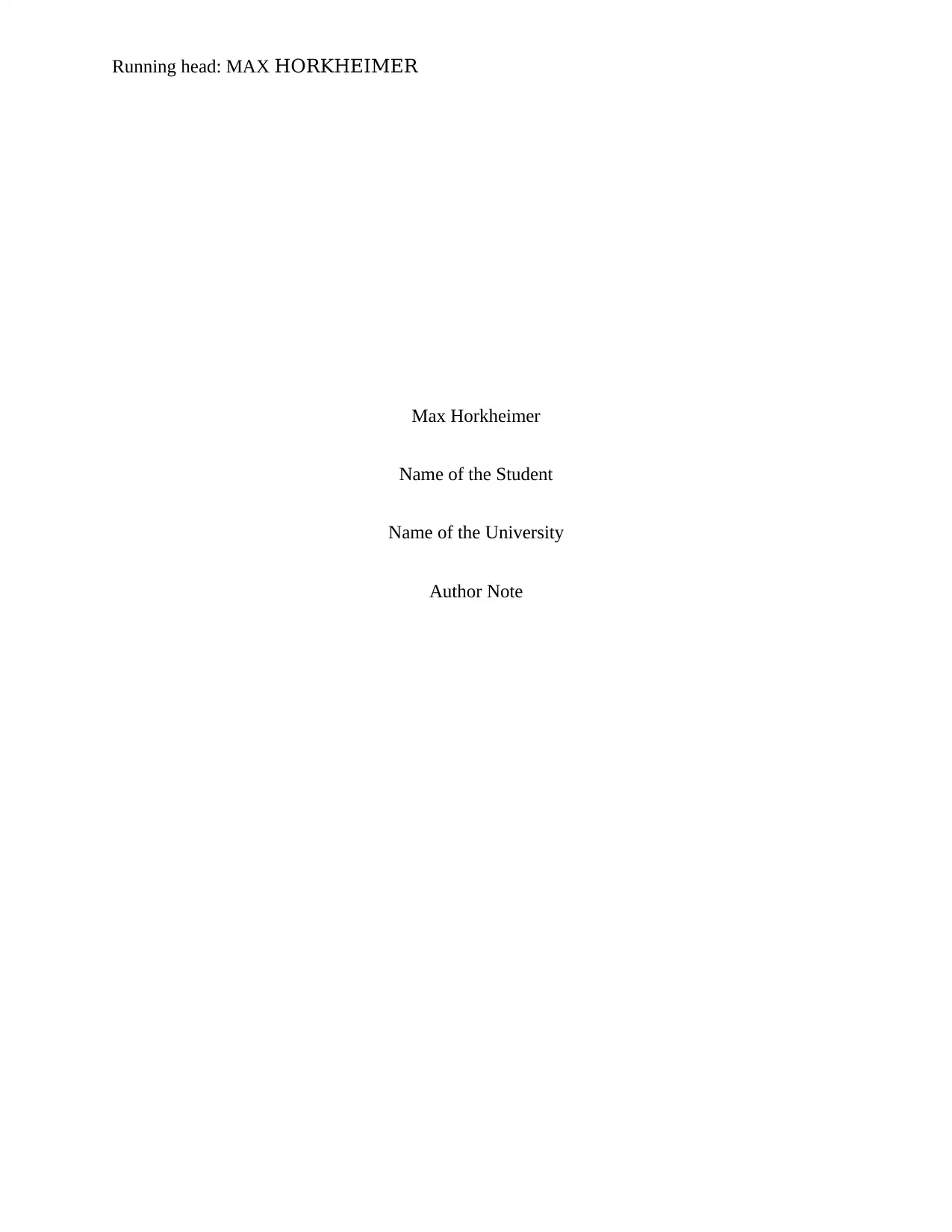
Running head: MAX HORKHEIMER
Max Horkheimer
Name of the Student
Name of the University
Author Note
Max Horkheimer
Name of the Student
Name of the University
Author Note
Paraphrase This Document
Need a fresh take? Get an instant paraphrase of this document with our AI Paraphraser
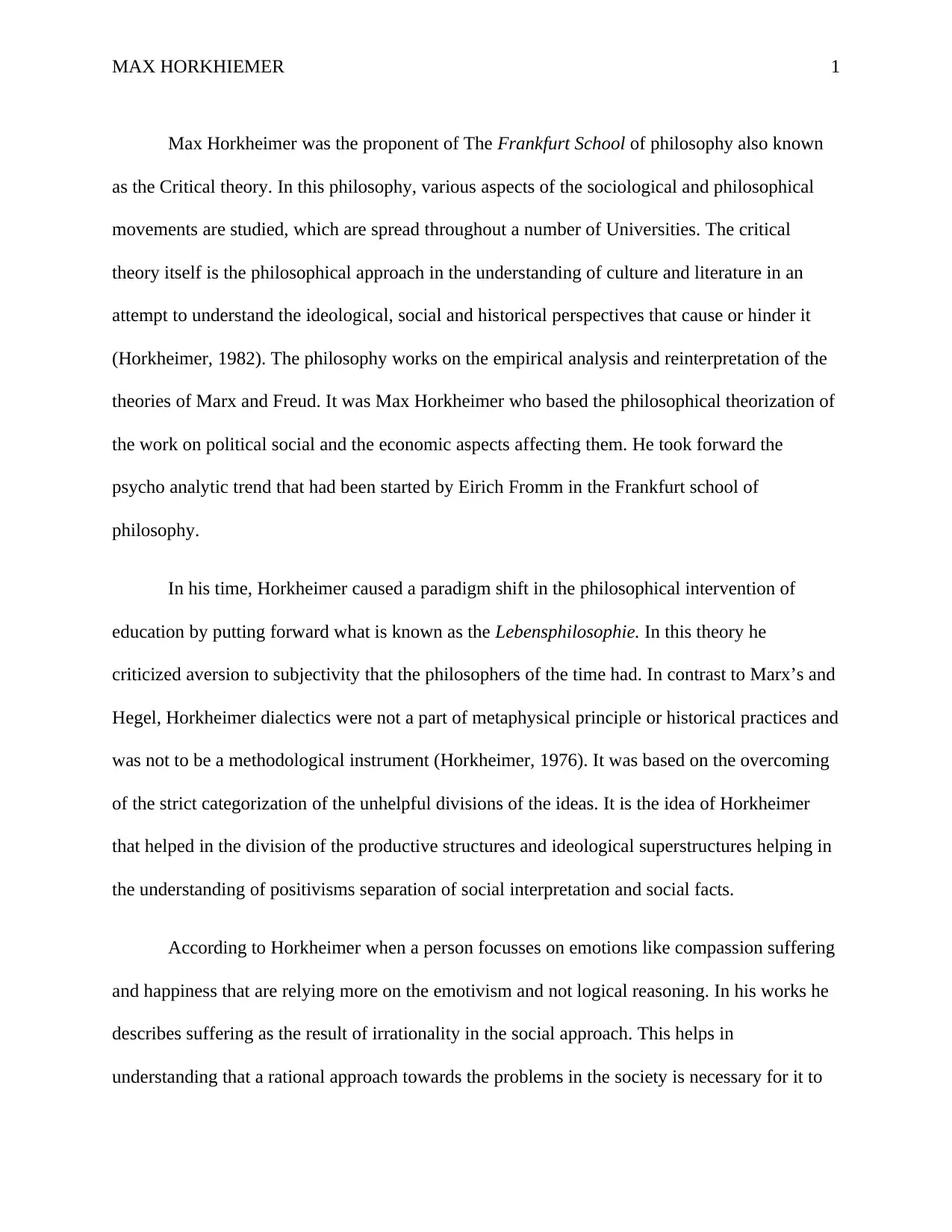
MAX HORKHIEMER 1
Max Horkheimer was the proponent of The Frankfurt School of philosophy also known
as the Critical theory. In this philosophy, various aspects of the sociological and philosophical
movements are studied, which are spread throughout a number of Universities. The critical
theory itself is the philosophical approach in the understanding of culture and literature in an
attempt to understand the ideological, social and historical perspectives that cause or hinder it
(Horkheimer, 1982). The philosophy works on the empirical analysis and reinterpretation of the
theories of Marx and Freud. It was Max Horkheimer who based the philosophical theorization of
the work on political social and the economic aspects affecting them. He took forward the
psycho analytic trend that had been started by Eirich Fromm in the Frankfurt school of
philosophy.
In his time, Horkheimer caused a paradigm shift in the philosophical intervention of
education by putting forward what is known as the Lebensphilosophie. In this theory he
criticized aversion to subjectivity that the philosophers of the time had. In contrast to Marx’s and
Hegel, Horkheimer dialectics were not a part of metaphysical principle or historical practices and
was not to be a methodological instrument (Horkheimer, 1976). It was based on the overcoming
of the strict categorization of the unhelpful divisions of the ideas. It is the idea of Horkheimer
that helped in the division of the productive structures and ideological superstructures helping in
the understanding of positivisms separation of social interpretation and social facts.
According to Horkheimer when a person focusses on emotions like compassion suffering
and happiness that are relying more on the emotivism and not logical reasoning. In his works he
describes suffering as the result of irrationality in the social approach. This helps in
understanding that a rational approach towards the problems in the society is necessary for it to
Max Horkheimer was the proponent of The Frankfurt School of philosophy also known
as the Critical theory. In this philosophy, various aspects of the sociological and philosophical
movements are studied, which are spread throughout a number of Universities. The critical
theory itself is the philosophical approach in the understanding of culture and literature in an
attempt to understand the ideological, social and historical perspectives that cause or hinder it
(Horkheimer, 1982). The philosophy works on the empirical analysis and reinterpretation of the
theories of Marx and Freud. It was Max Horkheimer who based the philosophical theorization of
the work on political social and the economic aspects affecting them. He took forward the
psycho analytic trend that had been started by Eirich Fromm in the Frankfurt school of
philosophy.
In his time, Horkheimer caused a paradigm shift in the philosophical intervention of
education by putting forward what is known as the Lebensphilosophie. In this theory he
criticized aversion to subjectivity that the philosophers of the time had. In contrast to Marx’s and
Hegel, Horkheimer dialectics were not a part of metaphysical principle or historical practices and
was not to be a methodological instrument (Horkheimer, 1976). It was based on the overcoming
of the strict categorization of the unhelpful divisions of the ideas. It is the idea of Horkheimer
that helped in the division of the productive structures and ideological superstructures helping in
the understanding of positivisms separation of social interpretation and social facts.
According to Horkheimer when a person focusses on emotions like compassion suffering
and happiness that are relying more on the emotivism and not logical reasoning. In his works he
describes suffering as the result of irrationality in the social approach. This helps in
understanding that a rational approach towards the problems in the society is necessary for it to
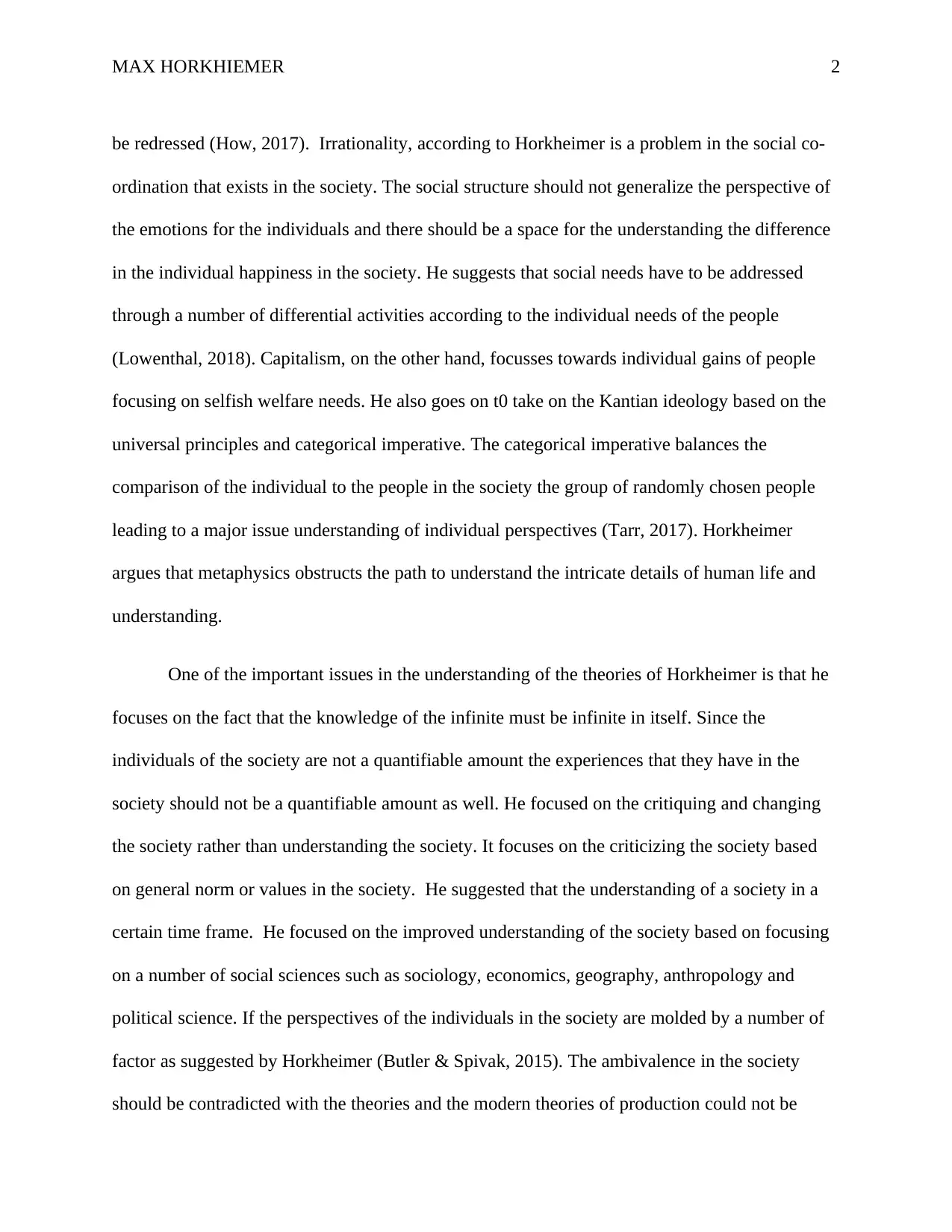
MAX HORKHIEMER 2
be redressed (How, 2017). Irrationality, according to Horkheimer is a problem in the social co-
ordination that exists in the society. The social structure should not generalize the perspective of
the emotions for the individuals and there should be a space for the understanding the difference
in the individual happiness in the society. He suggests that social needs have to be addressed
through a number of differential activities according to the individual needs of the people
(Lowenthal, 2018). Capitalism, on the other hand, focusses towards individual gains of people
focusing on selfish welfare needs. He also goes on t0 take on the Kantian ideology based on the
universal principles and categorical imperative. The categorical imperative balances the
comparison of the individual to the people in the society the group of randomly chosen people
leading to a major issue understanding of individual perspectives (Tarr, 2017). Horkheimer
argues that metaphysics obstructs the path to understand the intricate details of human life and
understanding.
One of the important issues in the understanding of the theories of Horkheimer is that he
focuses on the fact that the knowledge of the infinite must be infinite in itself. Since the
individuals of the society are not a quantifiable amount the experiences that they have in the
society should not be a quantifiable amount as well. He focused on the critiquing and changing
the society rather than understanding the society. It focuses on the criticizing the society based
on general norm or values in the society. He suggested that the understanding of a society in a
certain time frame. He focused on the improved understanding of the society based on focusing
on a number of social sciences such as sociology, economics, geography, anthropology and
political science. If the perspectives of the individuals in the society are molded by a number of
factor as suggested by Horkheimer (Butler & Spivak, 2015). The ambivalence in the society
should be contradicted with the theories and the modern theories of production could not be
be redressed (How, 2017). Irrationality, according to Horkheimer is a problem in the social co-
ordination that exists in the society. The social structure should not generalize the perspective of
the emotions for the individuals and there should be a space for the understanding the difference
in the individual happiness in the society. He suggests that social needs have to be addressed
through a number of differential activities according to the individual needs of the people
(Lowenthal, 2018). Capitalism, on the other hand, focusses towards individual gains of people
focusing on selfish welfare needs. He also goes on t0 take on the Kantian ideology based on the
universal principles and categorical imperative. The categorical imperative balances the
comparison of the individual to the people in the society the group of randomly chosen people
leading to a major issue understanding of individual perspectives (Tarr, 2017). Horkheimer
argues that metaphysics obstructs the path to understand the intricate details of human life and
understanding.
One of the important issues in the understanding of the theories of Horkheimer is that he
focuses on the fact that the knowledge of the infinite must be infinite in itself. Since the
individuals of the society are not a quantifiable amount the experiences that they have in the
society should not be a quantifiable amount as well. He focused on the critiquing and changing
the society rather than understanding the society. It focuses on the criticizing the society based
on general norm or values in the society. He suggested that the understanding of a society in a
certain time frame. He focused on the improved understanding of the society based on focusing
on a number of social sciences such as sociology, economics, geography, anthropology and
political science. If the perspectives of the individuals in the society are molded by a number of
factor as suggested by Horkheimer (Butler & Spivak, 2015). The ambivalence in the society
should be contradicted with the theories and the modern theories of production could not be
⊘ This is a preview!⊘
Do you want full access?
Subscribe today to unlock all pages.

Trusted by 1+ million students worldwide
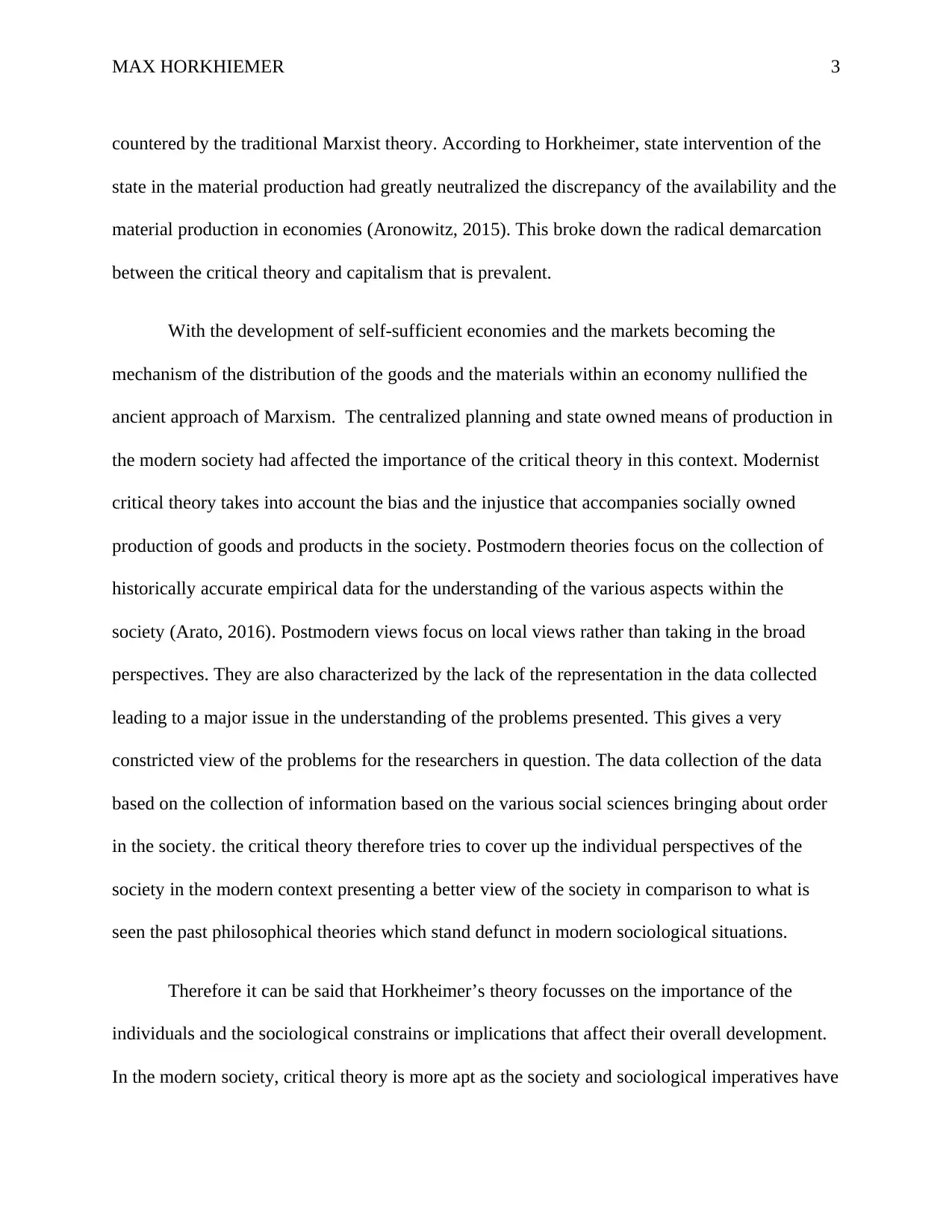
MAX HORKHIEMER 3
countered by the traditional Marxist theory. According to Horkheimer, state intervention of the
state in the material production had greatly neutralized the discrepancy of the availability and the
material production in economies (Aronowitz, 2015). This broke down the radical demarcation
between the critical theory and capitalism that is prevalent.
With the development of self-sufficient economies and the markets becoming the
mechanism of the distribution of the goods and the materials within an economy nullified the
ancient approach of Marxism. The centralized planning and state owned means of production in
the modern society had affected the importance of the critical theory in this context. Modernist
critical theory takes into account the bias and the injustice that accompanies socially owned
production of goods and products in the society. Postmodern theories focus on the collection of
historically accurate empirical data for the understanding of the various aspects within the
society (Arato, 2016). Postmodern views focus on local views rather than taking in the broad
perspectives. They are also characterized by the lack of the representation in the data collected
leading to a major issue in the understanding of the problems presented. This gives a very
constricted view of the problems for the researchers in question. The data collection of the data
based on the collection of information based on the various social sciences bringing about order
in the society. the critical theory therefore tries to cover up the individual perspectives of the
society in the modern context presenting a better view of the society in comparison to what is
seen the past philosophical theories which stand defunct in modern sociological situations.
Therefore it can be said that Horkheimer’s theory focusses on the importance of the
individuals and the sociological constrains or implications that affect their overall development.
In the modern society, critical theory is more apt as the society and sociological imperatives have
countered by the traditional Marxist theory. According to Horkheimer, state intervention of the
state in the material production had greatly neutralized the discrepancy of the availability and the
material production in economies (Aronowitz, 2015). This broke down the radical demarcation
between the critical theory and capitalism that is prevalent.
With the development of self-sufficient economies and the markets becoming the
mechanism of the distribution of the goods and the materials within an economy nullified the
ancient approach of Marxism. The centralized planning and state owned means of production in
the modern society had affected the importance of the critical theory in this context. Modernist
critical theory takes into account the bias and the injustice that accompanies socially owned
production of goods and products in the society. Postmodern theories focus on the collection of
historically accurate empirical data for the understanding of the various aspects within the
society (Arato, 2016). Postmodern views focus on local views rather than taking in the broad
perspectives. They are also characterized by the lack of the representation in the data collected
leading to a major issue in the understanding of the problems presented. This gives a very
constricted view of the problems for the researchers in question. The data collection of the data
based on the collection of information based on the various social sciences bringing about order
in the society. the critical theory therefore tries to cover up the individual perspectives of the
society in the modern context presenting a better view of the society in comparison to what is
seen the past philosophical theories which stand defunct in modern sociological situations.
Therefore it can be said that Horkheimer’s theory focusses on the importance of the
individuals and the sociological constrains or implications that affect their overall development.
In the modern society, critical theory is more apt as the society and sociological imperatives have
Paraphrase This Document
Need a fresh take? Get an instant paraphrase of this document with our AI Paraphraser
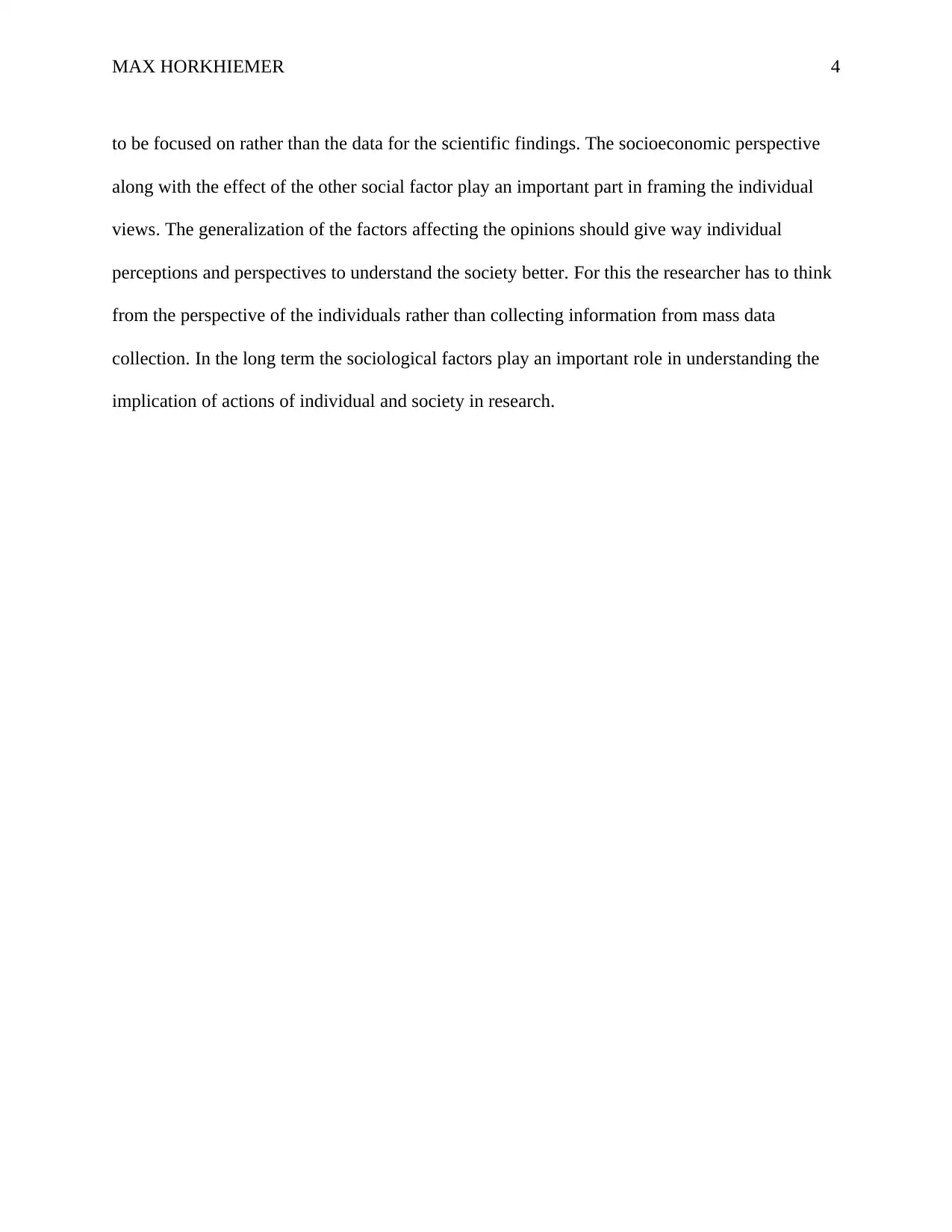
MAX HORKHIEMER 4
to be focused on rather than the data for the scientific findings. The socioeconomic perspective
along with the effect of the other social factor play an important part in framing the individual
views. The generalization of the factors affecting the opinions should give way individual
perceptions and perspectives to understand the society better. For this the researcher has to think
from the perspective of the individuals rather than collecting information from mass data
collection. In the long term the sociological factors play an important role in understanding the
implication of actions of individual and society in research.
to be focused on rather than the data for the scientific findings. The socioeconomic perspective
along with the effect of the other social factor play an important part in framing the individual
views. The generalization of the factors affecting the opinions should give way individual
perceptions and perspectives to understand the society better. For this the researcher has to think
from the perspective of the individuals rather than collecting information from mass data
collection. In the long term the sociological factors play an important role in understanding the
implication of actions of individual and society in research.
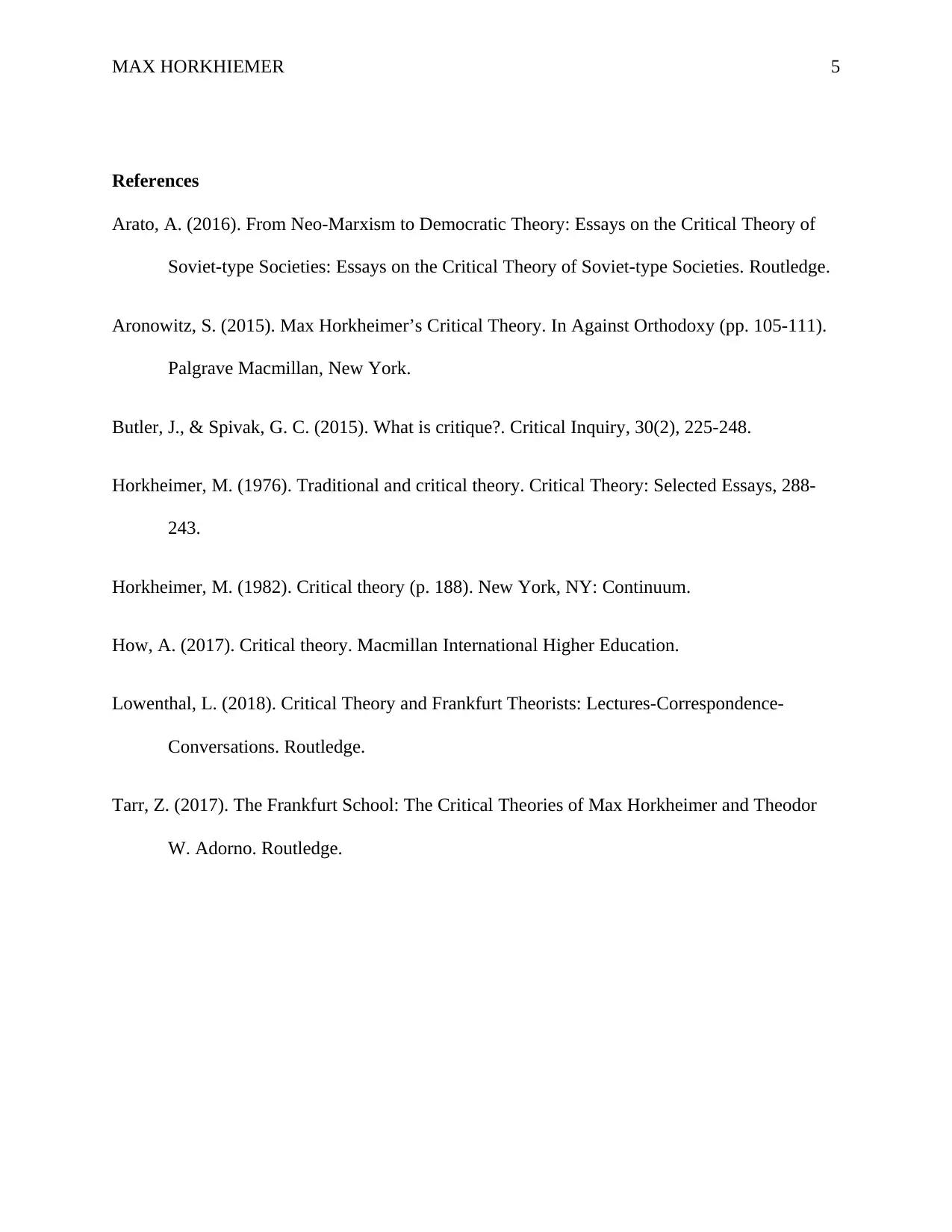
MAX HORKHIEMER 5
References
Arato, A. (2016). From Neo-Marxism to Democratic Theory: Essays on the Critical Theory of
Soviet-type Societies: Essays on the Critical Theory of Soviet-type Societies. Routledge.
Aronowitz, S. (2015). Max Horkheimer’s Critical Theory. In Against Orthodoxy (pp. 105-111).
Palgrave Macmillan, New York.
Butler, J., & Spivak, G. C. (2015). What is critique?. Critical Inquiry, 30(2), 225-248.
Horkheimer, M. (1976). Traditional and critical theory. Critical Theory: Selected Essays, 288-
243.
Horkheimer, M. (1982). Critical theory (p. 188). New York, NY: Continuum.
How, A. (2017). Critical theory. Macmillan International Higher Education.
Lowenthal, L. (2018). Critical Theory and Frankfurt Theorists: Lectures-Correspondence-
Conversations. Routledge.
Tarr, Z. (2017). The Frankfurt School: The Critical Theories of Max Horkheimer and Theodor
W. Adorno. Routledge.
References
Arato, A. (2016). From Neo-Marxism to Democratic Theory: Essays on the Critical Theory of
Soviet-type Societies: Essays on the Critical Theory of Soviet-type Societies. Routledge.
Aronowitz, S. (2015). Max Horkheimer’s Critical Theory. In Against Orthodoxy (pp. 105-111).
Palgrave Macmillan, New York.
Butler, J., & Spivak, G. C. (2015). What is critique?. Critical Inquiry, 30(2), 225-248.
Horkheimer, M. (1976). Traditional and critical theory. Critical Theory: Selected Essays, 288-
243.
Horkheimer, M. (1982). Critical theory (p. 188). New York, NY: Continuum.
How, A. (2017). Critical theory. Macmillan International Higher Education.
Lowenthal, L. (2018). Critical Theory and Frankfurt Theorists: Lectures-Correspondence-
Conversations. Routledge.
Tarr, Z. (2017). The Frankfurt School: The Critical Theories of Max Horkheimer and Theodor
W. Adorno. Routledge.
⊘ This is a preview!⊘
Do you want full access?
Subscribe today to unlock all pages.

Trusted by 1+ million students worldwide
1 out of 6
Your All-in-One AI-Powered Toolkit for Academic Success.
+13062052269
info@desklib.com
Available 24*7 on WhatsApp / Email
![[object Object]](/_next/static/media/star-bottom.7253800d.svg)
Unlock your academic potential
Copyright © 2020–2026 A2Z Services. All Rights Reserved. Developed and managed by ZUCOL.
